| In
all the major cities in Crete
at least once weekly
there is held street market (Laiki
Agorá or just
Laiki), where local
farmers, fishermen and other small
traders gather. It
takes place in a
particular street that is
closed off - often
to the annoyance of the
street's residents because they have to
remove their parked cars. |
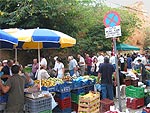
|
|
|
|
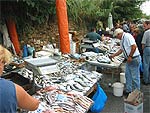 |
Early
in the morning
the merchants set up their
stalls, and the range of goods
that are being sold are
diverse: all kinds of
vegetables and fruit,
living chickens and rabbits,
snails, fish, cheese and yogurt,
wine and raki, textiles, clothes,
shoes, cheap watches and
jewelry and old
tools. |
|
|
|
| Of
course there are
also a couple of grills
where you can satisfy
your hunger with a few small
souvlakis, xilakia. If
you do not like meat,
you can instead buy a koulouri,
bread wreath with sesame
seeds. |
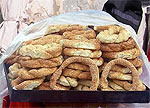
|
|
|
|
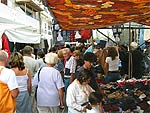 |
As
the goods
in general - and especially
clothes and shoes - are
considerably cheaper than in
the ordinary shops, the
market is filled up with a
lot
of people all day. |
|
|
|
| The
stalls
are rented through the
municipality, and sometimes
you can experience the police
checking the merchants'
papers. If they are not valid, there will be promptly
be made out a fine - a
quite heavy fine (from
300 to 20,000 €). |
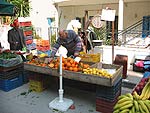
|
|
|
|
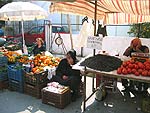 |
There
are two kinds of licenses:
one for the "merchants" which - as
far as possible - favors socially
disadvantaged
persons,
and one for the "producers",
who contribute to the production or
at least are related to the producers. |
|
|
|
|
|
|
| In
addition to
the licenses, there are also
other regulations. Some years
ago it was introduced by law that
the traders should have cash
registers, in order to reduce black income.
Another regulation decided that stalls, which do not deal with
food, must be placed at the beginning or
the end of the market, so they
are clearly separated from the
rest of the stalls. |
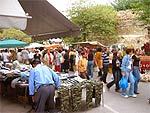
|
|
|
|
|
|
|
|
|
|
|
|
|
|
|
|